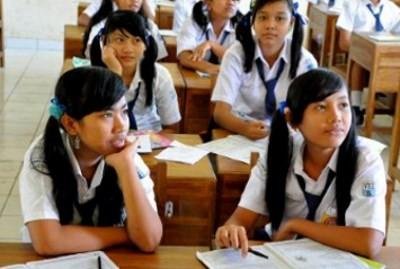
Indonesia is the fourth most populated country in the world with a high proportion of young people making up its demographics. According to Statistics Indonesia (BPS), the total of the school-age population in Indonesia in 2015 was 109.2 million or 42.7% of its total population of 255.5 million people. A study by the United Nations Population Fund (UNFPA) in 2015 revealed that Indonesia is projected to reap a demographic dividend from 2028 to 2035. A demographic dividend occurs when the proportion of the working-age population is larger than the infant and elderly population and presents a unique opportunity for intense economic growth (See Indonesia’s Economic Outlook in 2017: Remain Cautiously Optimistic).
An Overview of the Indonesian Education System
One of the current government’s primary focuses in the education sector in the face of global competition is improving and increasing the number of vocational training institutions and schools in the country
In 2035, Indonesia will have a workforce of 65 million young people and therefore productive citizens. This demographic dividend will provide a golden opportunity for Indonesia to become a developed country if it is able to improve and prepare its human resources.
Based on Law No. 20/2003 on the National Education System, Indonesia’s national education system consists of formal, non-formal, and informal educational systems as well as including several types of education such as general, religious, vocational, professional, and special education. Formal education comprises of several levels, starting from early childhood education, primary school of 6 years, junior secondary schools of 3 years, senior secondary school of 3 years, and higher education.
The country’s higher education system comprises universities, institutes, schools of higher learning, academies, and polytechnics. These institutions offer degree and non-degree programmes (See Second Class: Indonesia’s Higher Education Sector In Need of Reform).
In addition to the government, the private sector, including foreign-owned entities, and the community are allowed to provide education to Indonesian citizens so long as they meet the requirements and comply with the prevailing laws and regulations.
Since 2010, the Indonesian government has excluded the education sector from the negative investment list (See Indonesia’s New Negative Investment List; A Big Bang?) and allows foreign entities to own varying percentage stakes in educational institutions provided that they meet the requirements (See Indonesia’s Education Sector: Promising Investment Despite Need for Reforms). In addition, they are also obliged to partner with local institutions based on Government Regulation No. 17/2010 on the Management and Organisation of Education and the Decree of Ministry of Education and Culture No. 31/2014 on the Partnership between Foreign and Domestic Educational Institutions in the Management and Organisation of Education in Indonesia.
Starting from 31st December 2014, however, the Indonesian government set stricter requirements for foreign entities investing in the education sector. For example, foreign-owned primary and secondary schools are no longer allowed to affix the “international” label in their names. They must either change their name into a national school, a diplomatic school, or a cooperation education unit (SPK) school (See Private Education in Indonesia – International Schools on the Rise).
Private foundations planning to open an SPK school must already have a grade A private national school as a partner. The number of foreign teachers in SPK schools must not exceed 70% and they must be fluent in the Indonesian language. The schools are also obliged to offer compulsory subjects in the Indonesian language and culture, religion, and citizenship. Additionally, all Indonesian students must take a National Examination (UN). Most importantly, SPK schools must provide high-quality facilities to their students.
Indonesia’s new education goal: Prioritising skills over knowledge
Education has been one of the primary focuses of the current administration following the implementation of the ASEAN Economic Community (See Indonesia and the ASEAN Economic Community – Ready for Regional Integration?). Under this free trade agreement, foreign workers are allowed to seek employment in Indonesia as long as they meet the requirements. If the Indonesian workforce lack required skills and relevant education (See Labour Pains in Indonesia), the opportunity of the demographic dividend will be lost and foreign nationals will fill the skills gap leading to socio-political tensions and reduced economic mobility.
Indonesia must first define which qualities are important in producing its skilled workers. In our opinion, this goes beyond knowledge and technical skills in that a more holistic approach is needed; by also empowering our students with necessary soft skills as well as shaping their character and mentality.
University of Surabaya
Prof. Ir. Joniarto Parung, MMBAT, Ph.D
University
Global Business Guide Indonesia - 2017
Hi! I am a robot. I just upvoted you! I found similar content that readers might be interested in:
http://www.gbgindonesia.com/en/education/article/2017/an_overview_of_the_indonesian_education_system_11747.php
Downvoting a post can decrease pending rewards and make it less visible. Common reasons:
Submit
Congratulations @aroel! You have completed some achievement on Steemit and have been rewarded with new badge(s) :
Click on any badge to view your own Board of Honor on SteemitBoard.
For more information about SteemitBoard, click here
If you no longer want to receive notifications, reply to this comment with the word
STOPDownvoting a post can decrease pending rewards and make it less visible. Common reasons:
Submit